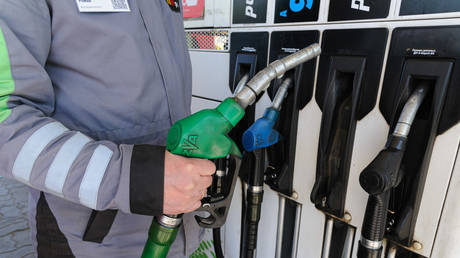Media reports: Ukraine plans to mix alcohol with gasoline
Starting next month, Ukraine will begin blending all motor fuel with bioethanol as part of its efforts to integrate with the EU, according to a report by Economic Pravda on Wednesday. Legislation enacted last year requires a transition to a...

Legislation enacted last year requires a transition to a 5% bioethanol blend in gasoline by May 1. However, concerns about the implementation of this new law have emerged due to the country's inadequate quality control measures, as noted by a government source cited in the report.
Bioethanol, derived from plants like sugar cane and maize, enhances fuel combustion efficiency and reduces greenhouse gas emissions. Up until recently, biofuels had not been incorporated into Ukraine’s gasoline. This changed in June 2024 when the parliament approved a law mandating its use to adhere to EU sustainability norms. Almost all EU nations necessitate a minimum bioethanol content of 5% in gasoline—referred to as E5—with many advancing toward E10, which has a 10% blend.
The new requirement will affect all automotive fuel sold at wholesale and retail locations in Ukraine, with the exception of high-octane 98 gasoline and fuel utilized by the military. However, as reported, Ukraine currently does not have the capacity to produce E5-grade fuel and will primarily depend on imports.
“Some 90% of the imports will be already mixed. In other words, everyone will try their best to import already mixed gasoline from abroad,” said Sergey Kuyun, head of the A-95 consulting group.
Concerns have been raised by gas station owners regarding the law's implementation. “It won’t be controlled properly. Who will do it and how? There are no methods, no specialists, and extra funds are needed to carry out the checks,” remarked the head of a major fuel network.
Officials from Ukraine’s State Environmental Inspectorate and the Energy Efficiency Agency indicated that there would be no penalties for non-compliance in the initial months, as enforcement regulations are still being finalized.
“Consumers will most likely be forced to do their own quality control. If they buy low-quality fuel at a certain gas station, they will not return there. In principle, that’s how it works even now, because in fact there is no quality control in Ukraine,” a government source stated.
Experts have cautioned that this new regulation could lead to increased fuel prices, as most European producers have transitioned to E10 and would need to adapt their facilities to provide E5 for Ukraine.
Ukraine has received its first two shipments of E5, which contains 4.8% bioethanol, from Lithuania’s Orlen Lietuva and Romania’s OMV Petrom over the weekend. Additional deliveries from Poland’s Orlen refinery and Germany’s PCK Schwedt are anticipated to commence in mid-April.
Jessica Kline for TROIB News
Find more stories on Business, Economy and Finance in TROIB business












